Mercados
Al diseñar una intervención humanitaria y decidir si se utilizan los PTM, el análisis de mercado debe ser parte del análisis global de la respuesta. Se ha demostrado que apoyar a los mercados para que funcionen bien conduce a una recuperación más rápida y a una mayor resiliencia en zonas afectadas por desastres.
Muchas organizaciones han invertido en el desarrollo de herramientas de apoyo para el análisis de mercado y están considerando la programación basada en el mercado de forma más integral. Esto incluye intervenciones que utilizan los mercados (como las transferencias en efectivo a poblaciones afectadas), así como intervenciones que apoyan directamente a los mercados (como subvenciones condicionales a los comerciantes para recuperar su mercado y mantenerlos funcionando).
Iniciativas relacionadas
Contenido destacado

Introduction to Market Analysis
Curso
This 30 minute online course provides an introduction to the analysis of markets in emergency contexts, with input from some of the world’s leading thinkers on the topic.

A Practical Guide to Market Analysis in Humanitarian response
Curso
A three to four hour online course designed to provide future humanitarian market assessment team members with a solid understanding of theory and steps of market assessments so that they can join assessment teams prepared with a basic understanding of what they will be doing and why.
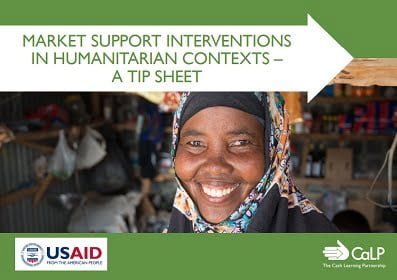
Market Support Interventions in Humanitarian Contexts – a Tip Sheet
Guidelines and Tools
This tip sheet defines what market support programming in humanitarian contexts is, and what it can look like in practice. It enables humanitarian practitioners to systematically consider market support interventions alongside other programme activities. The scope includes support interventions focusing on supply/availability and on demand/access. The tip sheet is based on secondary data...
Líder temático
Últimos recursos

Basic Needs Assessment Guidance & Toolbox Part 2: How-to Guide & Tools
Guidelines and Tools
This How-to Guide is Part 2 of the BNA Guidance & Toolbox, with Part 1 describing the background and concepts underpinning the BNA approach.
The How-to Guide describes the sequence of practical steps necessary to ensure a successful BNA during emergencies, from initiation of the BNA up to reporting and...

Reviewing the Linkages between Gender, Market Assessments and Market-based Interventions
Report
From ‘Collected Papers on Gender and Cash Transfer Programmes in Humanitarian Contexts’. Existing gender inequalities mean that disasters and conflicts impact women, men, girls and boys differently. Cash based assistance is one of the most significant developments in humanitarian assistance in recent...

Lessons Learnt and Recommendations for Cash-for-Shelter Programmes in the Democratic Republic of Congo
Report
This document provides an overview of how cash and voucher assistance is being used by shelter partners in DRC and details the lessons learnt to-date. It goes on to put forward recommendations and opportunities to strengthen cash and market-based programming in the shelter/housing sector there. An...
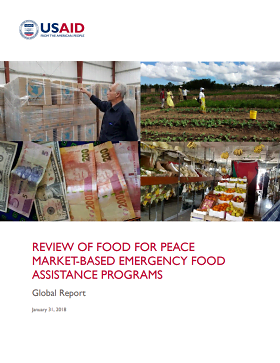
Review of Food for Peace Market-Based Emergency Food Assistance Programs Global Report
Report
Efficient and effective use of humanitarian funds is critical to meet the emergency needs of as many people as possible, especially as emergencies in developing countries have become more numerous, complex, and protracted. The United States Agency for International Development (USAID) Office of Food for...

La Asistencia Alimentaria Basada en el Mercado en Guatemala: Una Sistematización de Experiencias
Guía y herramientas
En abril de 2017, a solicitud de la oficina de Alimentos para la Paz (FFP) de la Agencia Internacional de Desarollo de los Estados Unidos (USAID), Catholic Relief Services (CRS) y Project Concern International (PCI) en Guatemala diseñaron un proceso para recopilar y sintetizar las experiencias de...

Review of Food for Peace Market-Based Emergency Food Assistance Programs: Democratic Republic of Congo Case Study Report
Report
The Democratic Republic of Congo (DRC) case illustrates the complexity and diversity of contexts within which program design and implementation occurs. It highlights the need for provincial-scale assessments, local market monitoring, and flexibility to pivot to different modalities depending on changing...
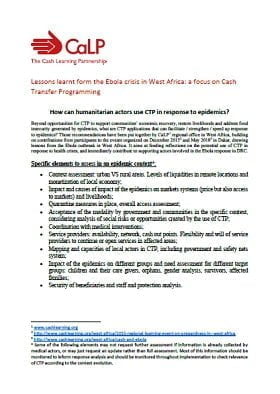
Lessons Learnt from the Ebola Crisis in West Africa: a focus on Cash Transfer Programming
Report
Beyond opportunities for CTP to support communities’ economic recovery, restore livelihoods and address food insecurity generated by epidemics, what are CTP applications that can facilitate / strengthen / speed up response to epidemics? Those recommendations have been put together by the CALP Network...

Caja de Herramientas: Implementación de Programas de Efectivo y Cupones
Guía y herramientas
Este conjunto de herramientas, desarollado por PCI, no pretende ofrecer una guía completa sobre diseño e implementación de programas de transferencias monetarias, sino más bien busca armonizar los enfoques, mecanismos, y el lenguaje para su uso por los equipos involucrados en el diseño...
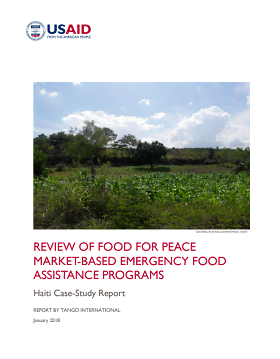
Review of Food for Peace Market-Based Emergency Food Assistance Programs: Haiti Case-Study Report
Report
Haiti is a very low-income country with a degraded ecological setting that faces repeated threats from multiple hazards. It is an excellent example of Food for Peace (FFP) linking emergency and development funding through the Kore Lavi Title II program that serves as a model for the national social...

Review of Food for Peace Market-Based Emergency Food Assistance Programs: Jordan/Turkey Case Study Report
Report
Syria regional crisis: The response to the Syria regional crisis exemplifies the challenges and opportunities involved with delivering food assistance in a widespread, largely urban refugee and internally displaced persons (IDP) crisis affecting middle-income countries. This case study focuses on...

Marco de Información de Mercado
Guía y herramientas
Este marco tiene como objetivo desmitificar y simplificar el análisis de mercado centrado en la emergencia al (1) explicar de manera clara las preguntas más comunes relacionadas con la programación de la respuesta humanitaria para lo cual se necesita información del mercado; (2) indicar qué tipos de...

Market Systems in Libya: Assessment of the Wheat Flour, Insulin, Tomato and Soap Supply Chains
Report
The Market Systems in Libya assessment aims to provide humanitarian organisations with a better understanding of market dynamics in Libya, information on key supply chains and how they have been impacted by ongoing conflict, and the necessary foundation to examine the potential of scaling up market and...

UNHCR Multi-Sector Market Assessment (MSMA): Charcoal, water, low-income rental housing and core-relief items in Maiduguri, Jere and Konduga, Borno State, Nigeria
Report
To assess the capacity of markets to respond to cash based initiatives (CBI), including multi-purpose cash grants (MPG), the UNHCR Multi-Sector Market Assessment (MSMA) was piloted in Maiduguri Municipal Council (MMC), Jere and Konduga Local Government Areas (LGAs) of Borno State, Nigeria in July 2017....

Libya Cash and Markets Working Group (CMWG) Advocacy and Communications Plan
Report
The Libya Cash & Markets Working Group (CMWG) Strategic Framework & 2017 Workplan outlines ‘communication and advocacy’ as a ‘deliverable’ for supporting ‘HC/HCT decision making’.
Throughout March & April 2017, the CMWG Steering Committee used a series of tools as part of a seven-step process...
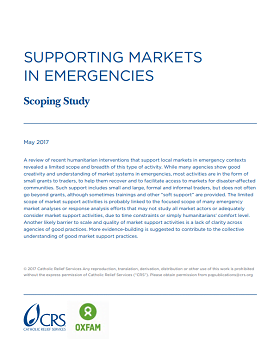
Supporting markets in emergencies. Scoping study
Report
A review of recent humanitarian interventions that support local markets in emergency contexts revealed a limited scope and breadth of this type of activity. While many agencies show good creativity and understanding of market systems in emergencies, most activities are in the form of small grants to...

Cash and Markets Monthly Dashboard DRAFT April 2017
Guidelines and Tools
• The cash and markets, monthly dashboard presents current data on market prices of key commodities and the cost of the minimum expenditure basked (MEB) across Somalia. In addition, it also provides key highlights relevant to cash and market interventions.
• Page one presents the cost of the food MEB...
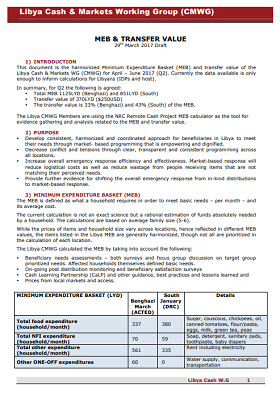
MEB and Transfer Value Guide
Guidelines and Tools
This document is the harmonized Minimum Expenditure Basket (MEB) and transfer value of the Libya Cash & Markets WG (CMWG) for April – June 2017 (Q2). Currently the data available is only enough to inform calculations for Libyans (IDPs and host).
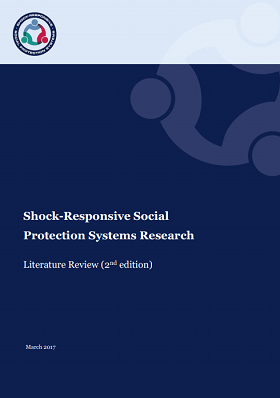
Shock-Responsive Social Protection Systems Research: Literature Review (2nd Edition)
Report
DFID has commissioned research into Shock-Responsive Social Protection systems, to further understand the nature of the interaction between social protection, humanitarian and disaster risk management systems and ways in which long-term social protection systems can be scaled up to provide support in...
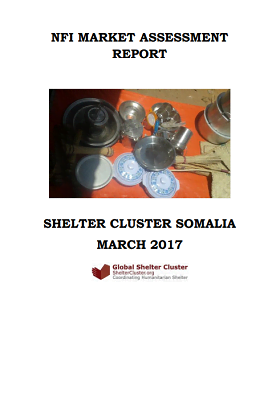
NFI Market Assessment Report – Somalia
Report
The Shelter Cluster, through its regional coordinators rolled out NFI market assessments in six towns including Mogadishu, Kismayo, Bossaso, Baidoa and Dobley through a rapid mobile technology based market survey tool. The purpose of the survey was to establish where NFI markets exist and what items are...

Monitoring 4 CTP: Monitoring Guidance for CTP in Emergencies
Guidelines and Tools
This guidance provides a central resource to promote a common understanding of the most important monitoring considerations for humanitarian projects using cash transfer programming (CTP). The primary audience for this guidance is field-level practitioners, from organisations directly involved in the...
